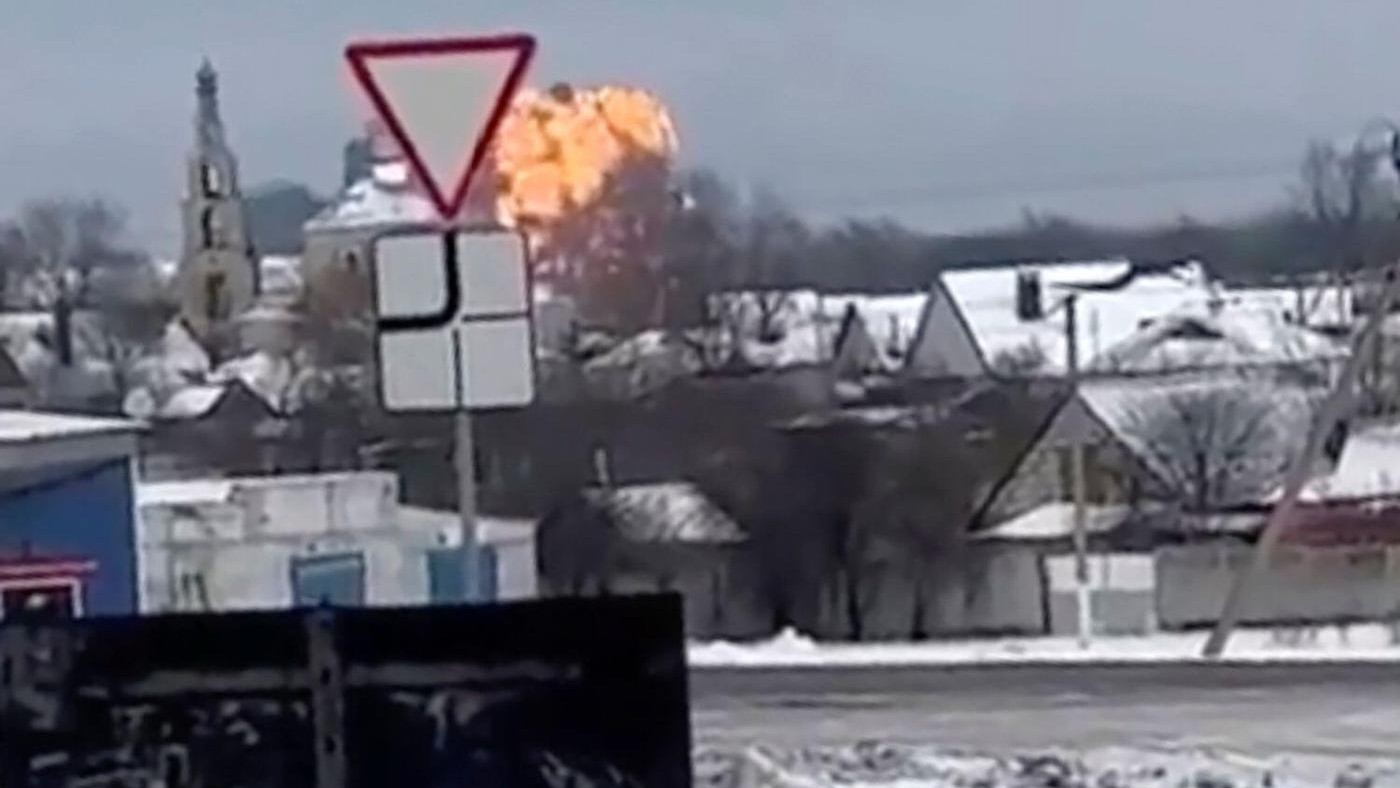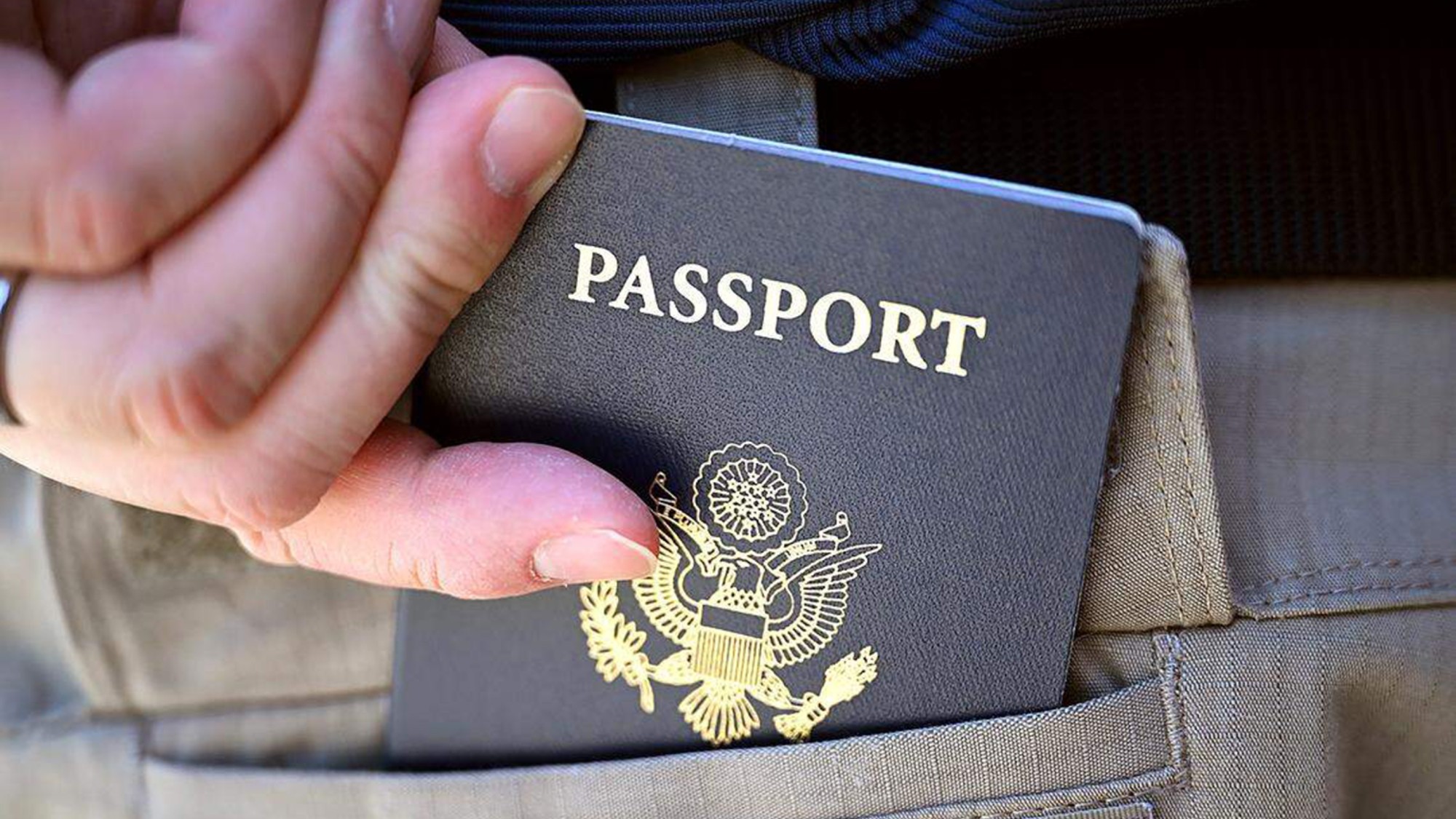How downed prisoner-of-war plane leaves Kyiv and Moscow blaming each other
Claim and counter-claim follow deaths of 74 people, including 65 Ukrainian prisoners, in crash in southern Russia

A free daily email with the biggest news stories of the day – and the best features from TheWeek.com
You are now subscribed
Your newsletter sign-up was successful
The recriminations have begun after a Russian military transport plane was shot down near the Ukrainian border, resulting in the deaths of all 74 people on board.
The Il-76 aircraft, which Moscow said was carrying 65 Ukrainian prisoners-of-war (PoW) as well as crew, came down in the Belgorod region of southern Russia allegedly en route to a prisoner exchange. The Kremlin accused Ukraine's forces of shooting down the plane, but "offered no evidence", said The Washington Post, while Kyiv "didn’t immediately confirm or deny" any involvement.
Ukrainian president Volodymyr Zelenskyy did hit back at Russia's accusations on Wednesday night, saying Moscow was "playing with the lives of Ukrainian prisoners" and that the crash "occurred on Russian territory", which is "beyond our control".
The Week
Escape your echo chamber. Get the facts behind the news, plus analysis from multiple perspectives.

Sign up for The Week's Free Newsletters
From our morning news briefing to a weekly Good News Newsletter, get the best of The Week delivered directly to your inbox.
From our morning news briefing to a weekly Good News Newsletter, get the best of The Week delivered directly to your inbox.
Throughout the war, the two sides have exchanged "conflicting accusations", said the paper, and "establishing the facts has often been difficult".
What has Russia said?
The Kremlin has said emphatically that Ukraine is responsible for the "monstrous" and a "terrorist act", and "claimed Ukrainian forces stationed in the Kharkiv border region had fired two missiles", said Barron's.
The Russian defence ministry claimed it was a "scheduled flight", headed for an arranged prisoner swap on Wednesday. Though a planned (and subsequently cancelled) prisoner swap was confirmed by Ukraine, it is still unclear and unverified how many people were on the plane, who they were, and whether the plane was destined for the swap site.
Russian MP Andrei Kartapolov said that Ukraine may have used a Western-supplied Patriot missile to down the plane, though there is no evidence to support the claim.
A free daily email with the biggest news stories of the day – and the best features from TheWeek.com
The credibility of Russia's account is already under question. With the Kremlin's "long history of brazen lies and disinformation", said Sarah Rainsford on the BBC, such a claim requires "checking carefully before repeating". That doesn't mean everything Russia says is "untrue", she added, but unpicking the truth becomes increasingly difficult.
What has Ukraine said?
Ukrainian authorities remained quiet in the immediate aftermath of the crash, leaving a void that was "inevitably filled" by "Russia's noise", said Rainsford.
Later, reports emerged via the Ukrainska Pravda news site that sources within Ukraine's armed forces said downing the plane was "their job" and that the "Il-76 was carrying S-300 anti-aircraft missiles", said The Moscow Times. That claim has also not been verified.
Ukraine has not "directly" admitted it, added Rainsford, but statements from its military and intelligence chiefs "together amount to acknowledgement that Ukraine may have shot the plane down".
However, Kyiv insists it did not receive notice from Russia to "ensure airspace security" as it usually might, said Al Jazeera. Though a prisoner swap was scheduled, it is normal for information to come through on "what means of transport would be used and which routes" to ensure safe passage. Ukrainian intelligence is suggesting Russia's withholding of that information was "planned" amid "deliberate actions" to "weaken international support for our state". Russia claims Ukraine was informed.
Cross-border attacks in the Belgorod region have intensified in recent months, and in December Ukraine carried out its deadliest attack on Russian soil so far, killing 21 people after shelling the city of Belgorod.
What next?
President Zelenskyy has demanded an international investigation into the incident, while Russia has requested a meeting of the UN Security Council, which will meet later on Thursday.
But the downing of the plane has serious implications for the PoW exchanges. Kartapolov, the Russian MP, said the sides now "can't talk" about further exchanges; however, PoW swaps have dwindled since the summer anyway, in "stark contrast" to the first year of the war, said Politico.
There have been 48 swaps and 2,598 people have been returned to Ukraine since the war began, according to the Ukrainian military, but the "last major exchange" was in August last year.
Kyiv is blaming Russia for the lack of exchanges, but the consequences are "inflaming tensions" within Ukraine and the families of those still held by Russia. It is also creating further difficulty for Zelenskyy. The underwhelming counteroffensive and stalled support from Western allies means the "mood is turning grim".
Approximately 3,000 Ukrainian PoWs are being held by Russia, and Kyiv had hoped "to jar the Kremlin into restarting swaps", said Politico.
Richard Windsor is a freelance writer for The Week Digital. He began his journalism career writing about politics and sport while studying at the University of Southampton. He then worked across various football publications before specialising in cycling for almost nine years, covering major races including the Tour de France and interviewing some of the sport’s top riders. He led Cycling Weekly’s digital platforms as editor for seven of those years, helping to transform the publication into the UK’s largest cycling website. He now works as a freelance writer, editor and consultant.
-
 6 exquisite homes with vast acreage
6 exquisite homes with vast acreageFeature Featuring an off-the-grid contemporary home in New Mexico and lakefront farmhouse in Massachusetts
-
 Film reviews: ‘Wuthering Heights,’ ‘Good Luck, Have Fun, Don’t Die,’ and ‘Sirat’
Film reviews: ‘Wuthering Heights,’ ‘Good Luck, Have Fun, Don’t Die,’ and ‘Sirat’Feature An inconvenient love torments a would-be couple, a gonzo time traveler seeks to save humanity from AI, and a father’s desperate search goes deeply sideways
-
 Political cartoons for February 16
Political cartoons for February 16Cartoons Monday’s political cartoons include President's Day, a valentine from the Epstein files, and more
-
 ‘The mark’s significance is psychological, if that’
‘The mark’s significance is psychological, if that’Instant Opinion Opinion, comment and editorials of the day
-
 How ‘Manchesterism’ could change the UK
How ‘Manchesterism’ could change the UKThe Explainer The idea involves shifting a centralized government to more local powers
-
 ‘Dark woke’: what it means and how it might help Democrats
‘Dark woke’: what it means and how it might help DemocratsThe Explainer Some Democrats are embracing crasser rhetoric, respectability be damned
-
 San Francisco tackles affordability problems with free child care
San Francisco tackles affordability problems with free child careThe Explainer The free child care will be offered to thousands of families in the city
-
 The Mint’s 250th anniversary coins face a whitewashing controversy
The Mint’s 250th anniversary coins face a whitewashing controversyThe Explainer The designs omitted several notable moments for civil rights and women’s rights
-
 Vance’s ‘next move will reveal whether the conservative movement can move past Trump’
Vance’s ‘next move will reveal whether the conservative movement can move past Trump’Instant Opinion Opinion, comment and editorials of the day
-
 What have Trump’s Mar-a-Lago summits achieved?
What have Trump’s Mar-a-Lago summits achieved?Today’s big question Zelenskyy and Netanyahu meet the president in his Palm Beach ‘Winter White House’
-
 US citizens are carrying passports amid ICE fears
US citizens are carrying passports amid ICE fearsThe Explainer ‘You do what you have to do to avoid problems,’ one person told The Guardian